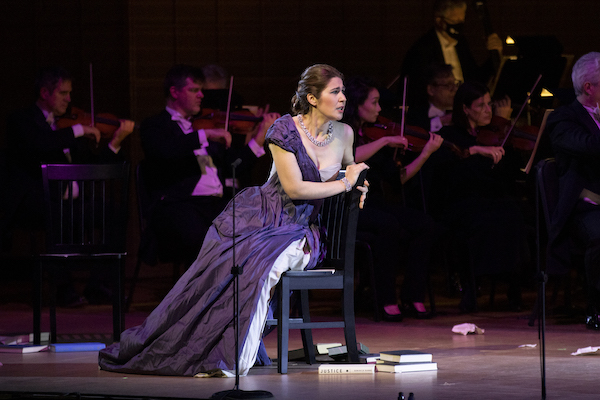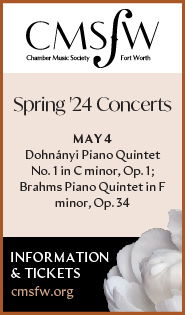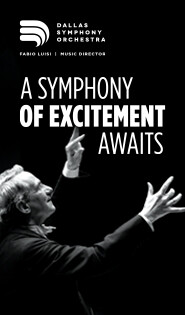“Onegin” is off and running in Dallas Symphony’s stellar concert staging

Pyotr Ilyich Tchaikovsky discarded a few operatic conventions when he composed Eugene Onegin. Adapting the libretto himself from Alexander Pushkin’s 1833 verse novel of the same name, Tchaikovsky aimed for an episodic retelling, not a contiguous one, in order to dramatize what he considered essential about the characters. This approach yielded a radiant and lyrical work that sets aside the novel’s extended narrative ruminations and centers the music on universal, recognizable emotions.
“I don’t give a damn about it not being a stageable opera,” Tchaikovsky once wrote to a pupil of his. “It has been well known for some time that I have no sense of stagecraft.” So when the Dallas Symphony Orchestra opened its run of Onegin as a semi-staged opera-in-concert Friday night at the Meyerson Symphony Center, one could be forgiven for expecting a straightforward, score-focused performance.
But what the orchestra, soloists, dancers and chorus offered audiences on opening night was so much more. Thoughtful staging, along with well-coordinated singing and playing, made for an inventive presentation of Tchaikovsky’s version of the story.
The plot is simple. At a country mansion, the daughter of a wealthy family, Tatyana, falls in love with her emotionally aloof neighbor, the eponymous Eugene. When she declares her feelings in a letter to him, he spurns her advances, preferring his life of hedonistic freedom. He later woos Tatyana’s more worldly sister, Olga, an affair that ends with Eugene killing his best friend — Olga’s suitor, Lenski — in a duel. Eugene abandons his pastoral home and, five years later, resurfaces to find that Tatyana has married. In one of literature’s (and opera’s) sweeter comeuppances, Eugene professes the love that he now realizes he feels for Tatyana, and is rejected.
With orchestra and cast sharing the Meyerson’s extended platform, and the Dallas Symphony Chorus perched on the choral terrace, Alberto Triola’s staging makes clever use of symbolism with noteworthy input from lighting designer Jessica Drayton. Hundreds of books stacked in piles frame the stage. The male chorus singers take on a witty, sign-posting role in the delivery of Tatyana’s amorous letter to Eugene. The production deploys stark, somber lighting and bolts of red fabric to give tragic weight and immediacy to Lenski’s death.
Australian soprano Nicole Car, in her DSO debut, was an arresting and stunning Tatyana. The character’s initial shyness was captured on Friday in a sweet, elastic lyricism, but the demands of the letter scene also showcased Car’s virtuosity to full effect: Her Tatyana was explosively passionate, ebbing and flowing between long, high-soaring lines and low, poignant passages as she gloried in her feelings for Eugene.
Car’s acting abilities were also up to the role, and her vocal characterizations from start to finish effectively conveyed Tatyana’s arc from naïve debutante to self-assured noble. Technically, she sang with a sureness of presence and tone, even in moments of emotional swelling where the orchestra overwhelmed other singers.
Baritone Etienne Dupuis, in his DSO debut, was a sturdy Eugene. Dupuis’ brassy timbre consistently cut through duets, trios, and quartets with an almost pompous vocal edge. Yet he still managed an expressive deftness that fully captured Eugene’s haughty disinterest in Tatyana. That early performance made for a devastating contrast to his Act III aria, in which Dupuis embodied a wild, desperate Eugene and, without over-singing, matched the orchestra in feeling and energy, and fully conveyed the disillusion of what Pushkin dubbed the “superfluous man.”
Tenor Pavol Breslik was an affecting and sympathetic Lenski. His Act II aria, “Let me die, but first,” was tender and poetic before erupting into dramatic anguish. Clear, ardent tones near the top of his register captured a necessary sense of fragility as the character reflected on his fatalistic attraction to Olga. Breslik at time struggled to stay above the orchestra, resulting in some forced singing But where it mattered most his tenor was crisp and light.
Olga, Tatyana’s sister, was slated to be sung by mezzo-soprano Deniz Uzun but travel complications forced her late replacement by Melody Wilson. Wilson’s rendition gave the flippant and fickle Olga a full-bodied warmth, though it often lacked the presence needed to stand up to the orchestra. Likewise, mezzo-soprano Alexis Galindo in the role of Larina, the sisters’ mother, was often lost beneath other musical elements, and her propensity for singing upstage did not help.
Brindley Sherratt was a vocal standout in his brief cameo as Tatyana’s aristocrat husband, Prince Gremin, delivering one of the most memorable arias of the score with a tone that was lovely and dark. Opera doesn’t give bass singers a lot of opportunities to express themselves this fully, and Sherratt’s performance was lyrical enough to make you wonder why not. It also earned him a raucous applause at the close of the aria.
Music director Fabio Luisi supplied a consistently energetic soundscape from open to close. A master of the operatic language, Luisi drew out supple, luxuriant color from the ensemble as they moved nimbly from rustic Russian dance scenes to turbulent high drama. Balances were off in a few spots, with the orchestra overpowering some featured vocalists, but the playing was superb throughout.
Joshua Habermann’s preparation of the chorus proved tight, as the singers employed a surprisingly clear command of Russian diction. Choreography was light and simple, but executed beautifully by dancers of the Pegasus Contemporary Ballet, coordinated by artistic director Diana Crowder.
The performance will be repeated 3 p.m. Sunday, April 3 and 7 p.m. Tuesday, April 5. dallassymphony.org


